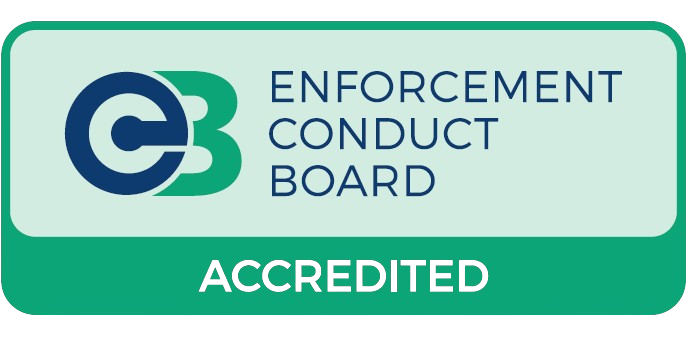Myth‑Busters: UK Bailiffs (Enforcement Agents)
There’s a lot of misinformation about what bailiffs (now called enforcement agents) can and can’t do. Below are 20 common myths — each followed by the reality.
1) Bailiffs are the same as debt collectors
Myth Debt collectors and bailiffs have the same powers.
Reality Enforcement agents act under warrants, writs or legal authority (e.g., CRAR) and can take control of goods. Debt collectors are agents of the creditor and have no statutory powers to enter or remove goods.
2) Bailiffs can break in on the first visit
Myth They can smash the door to collect most debts.
Reality For most debts entry must be peaceful (no violence and no one present objecting). Forced entry is tightly limited (e.g., specific criminal fines) or where a court order/writ authorises it. See our powers explainer.
3) Bailiffs can come at any hour
Myth Agents can visit in the middle of the night.
Reality Attendances are generally between 06:00–21:00 (or at business opening hours). Outside these times needs specific authority or circumstances.
4) You must let a bailiff in
Myth You’re legally required to open the door.
Reality For most debts you don’t have to grant entry. You can speak through a closed door and request proof. Different rules apply to evictions (warrants/writs of possession).
5) They can take anything
Myth All goods are at risk.
Reality Some items are exempt (basic household needs, medical items, tools of the trade up to the statutory limit). Third‑party goods should not be removed. If goods belong to someone else, provide evidence of third‑party ownership (e.g., receipts or finance documents).
6) Paying unlawful encampments to leave is cheaper
Myth Giving cash to an encampment is a quick, low‑cost fix.
Reality Paying to leave can be unlawful , encourages returns and may expose you to risk. The lawful options are common law trespass (for private landholders) or council action under CJPOA ss.77–78 , with police powers separate (ss.61/62A). See our encampment guidance.
7) CRAR can collect any lease sums
Myth CRAR covers service charge, insurance and VAT.
Reality CRAR is for net rent only . See CRAR overview and our legal guide.
8) A court order is always needed to end a lease for commercial rent arrears
Myth You must sue for possession first.
Reality Peaceable re‑entry (forfeiture) may be lawful if the lease allows and pre‑conditions are met. For non‑rent breaches a section 146 notice is usually required. See forfeiture.
9) Evicting travellers on private land always needs a court order
Myth The landowner must obtain a possession order.
Reality Landholders may use common law trespass to require trespassers to leave and remove them when done lawfully and proportionately. Councils may act under CJPOA ss.77–78 ; police have separate powers (ss.61/62A). See encampment guidance.
10) Councils and housing associations always need a court order to evict
Myth All evictions require a possession claim under CPR 55.
Reality Many placements are licences / excluded occupiers . The route is often notice + attendance rather than a possession claim, following policy and safeguarding. See our guidance.
11) Paying into a personal account is fine
Myth Agents sometimes use their own account.
Reality Never . Pay only via the methods on our paperwork/portal. If asked to pay an individual, stop and call our office. See privacy notice.
12) If I ignore bailiffs three times, it goes back to the council
Myth Not answering the door a few times forces a return of the case.
Reality Not engaging doesn’t resolve the matter. Councils and clients expect engagement; please contact us using the details on our notice to discuss options.
13) A £1 per month offer must be accepted
Myth Any token offer stops enforcement.
Reality Plans are by agreement , based on means and client instruction. Statutory fees (e.g., the compliance fee) still apply.
14) Bailiffs can tell my neighbours or employer about my debt
Myth They can discuss your case with anyone.
Reality We must protect your data and privacy. We only share what’s necessary for enforcement and verification. See our privacy notice.
15) Vulnerable people can’t be enforced against
Myth Vulnerability stops all action.
Reality Vulnerability changes how we act (pace, support, signposting) and may pause action, but each case is assessed with the client’s welfare policy. See policies.
16) I can just remove a car left on my land
Myth If someone leaves a vehicle on my property, I can tow it immediately.
Reality You must follow proper process (e.g., reasonable enquiries/notice) and avoid offences. Torts (Interference with Goods) Act 1977 and local schemes may apply. We can advise and arrange lawful removal.
17) Putting up a sign denying access stops enforcement
Myth A notice on the door citing common law or denying consent prevents attendance.
Reality Signs or pseudo‑legal wording do not override warrants, writs, CRAR or landlord rights. Agents follow the law and any court authority; you can ask for ID and contact our office, but enforcement may still proceed.
18) Bailiff fees can be ignored
Myth Only the original debt matters.
Reality Fees are set by the Taking Control of Goods Regulations and are statutory once triggered, and enforcement can continue until all fees are recovered .
19) Police must attend with bailiffs
Myth An attendance is invalid unless police are present.
Reality Police attend to prevent a breach of the peace or when using their own powers. Enforcement agents do not need police present to act lawfully.
20) Insolvency instantly stops everything
Myth A CVA/administration always halts all action immediately.
Reality Insolvency may impose a moratorium or require consent. The effect depends on the process and timing. Always seek advice; we’ll follow the law and client instruction.
See our practical pages: CRAR overview · Forfeiture · Encampments · Temporary Housing · Verify an Agent
Last updated: . England & Wales only. This page is general information; always check your lease, order or local policy.



